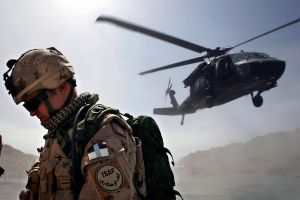Americans Support No-Fly Zone and Sanctions in Syria

With the fighting in Syria, the American public said they would support US participation to enforce sanctions and a no-fly zone in Syria.
Summary
With the fighting in Syria escalating into Damascus, there is still no consensus among UN Security Council members to push for sanctions or military intervention (as they did for Libya). But for their part, the American public is ready to support limited measures to intervene. Even before the violence spread into Damascus, Americans said they would support US participation in an international effort to enforce sanctions and a no-fly zone in Syria.
The Chicago Council Survey of over 1,800 Americans, fielded May 25 through June 8, asked Americans about a series of diplomatic and military options the US could pursue along with its allies to stem the fighting in Syria. Six in 10 said they supported increasing economic and diplomatic sanctions against the Syrian regime (63%), and nearly as many said they would support enforcing a no-fly zone over Syria (58%). Beyond these options, there is limited support for sending arms and supplies to anti-government groups in Syria (27%; 67% oppose), bombing Syrian air defenses (22%; 72% oppose) or sending troops into Syria (14%; 81% oppose).
In contrast to many other issues, support for these actions crosses partisan affiliation: majorities among Republicans, Democrats, and independents all support economic and diplomatic sanctions and a no-fly zone. Conversely, majorities across political party identification oppose other options.
Dina Smeltz, senior fellow of public opinion and foreign policy at The Chicago Council, commented that “The experience of Libya has primed American opinion toward the effectiveness of limited and multinational efforts to stem acts of government aggression against civilians. In addition, Chicago Council surveys have consistently shown broad support for multilateral intervention in cases in which a government engages in large scale violations of human rights.”
The most recent UN authorization of military force under Chapter VII, Resolution 1973, imposed strict sanctions and a no-fly zone over Libya. Notably, the air campaign was led by the UK and France, rather than the US. This approach proved popular with Americans: 79 percent approved of US participation at some level in the Libya operation.
A Note on Methods
This report is based on the results of The Chicago Council’s 2012 biennial survey of public opinion conducted from May 25 to June 8, 2012. The survey probes American attitudes on a wide range of US foreign policy issues. GFK Custom Research conducted the survey for The Chicago Council using a randomly selected sample of 1877 adults age 18 and older from their large-scale, nationwide research panel. The panel is recruited using stratified random digit dialing (RDD) telephone sampling. The margin of error for this survey is +/- 2.5%.

